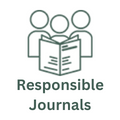Ethical guidelines for the use of Artificial Intelligence (AI) tools
The Editorial Fund of the Universidad Católica Luis Amigó recognizes the impact of artificial intelligence (AI) on intellectual production, and the possible advantages (such as idea generation and quick response to any question) and disadvantages (mainly data, facts and unverified content) that its use implies. From there, in the exercise of openness, observance, responsibility, transparency, respect, equality, among other principles and policies that govern it, the Editorial Fund outlines the following considerations for the creation of written and graphic material based on AI and AI-assisted technologies that may be submitted to it:
Reflection of the intellect. The texts, tables, graphs and all the content of the postulated works must be the product of the human intellect, that is, of a person's mind, reflecting his or her own style and creative capacity, academic training and professional career. In this sense, the information provided by the AI should be taken only as a reference, without being the exclusive tool for obtaining and analyzing data.
Authorship. The author, according to the Glossary of the World Intellectual Property Organization (WIPO - Voice 17), is "the person who creates a work". Consequently, this concept is inseparable from the reflection of the intellect or, in other words, from the faculty of intellectual creation inherent to the human being.
Responsibilities. It is the author's obligation to verify the information or data generated by the IA, using sources that have been evaluated by academic and scientific committees or that are housed in indexing systems, analyze the reliability of the data and make decisions regarding the form and substance of the work. Likewise, the author will be responsible for guaranteeing the originality and integrity of the work and the correct citation of the sources consulted, including those used by the AI to generate the text, as well as the artificial intelligence tool itself.
Warning. In case of detecting the incorporation of data or information obtained by AI without the corresponding analysis or prior notification to the Editorial Fund, the author will assume full responsibility and will defend the Universidad Católica Luis Amigó, who for all purposes acts as a third party in good faith.
Declaration of use. It is the authors' commitment to inform the Editorial Fund and the general public of the use of AI and AI-assisted technologies as a reference tool for the elaboration of their works. If published, a note will be included in the credits page, at the end of the articles or at the foot of the figure, as the case may be, stating the following:
The authors declare that they used (indicate the name of the tool), artificial intelligence (AI) and AI-assisted technologies, to.... (state the reason). The information provided by these tools was not included as suggested by such technology; everything obtained was verified, analyzed and intervened by the authors, consequently, they assume responsibility for the content of the publication.
Citations and references. As recommended by APA, the use of the AI tool should be mentioned indicating textually the message or question from which the answer was obtained. Textual citations will have the same parameters of other sources, according to the number of words (40 or more). For retrieval data and references, the structure will be the same as for software, mobile applications, devices and equipment (numeral 10.10 of the APA Publication Manual); note that in the date the year of the version used is indicated and in the title, the general name of the tool.
Scope of these guidelines. It applies to articles, books, chapters, memoirs, primers, manuals, short stories, poetry, texts for the blog, and any other type of written and graphic content to be published under the seal of the Editorial Fund of the Universidad Católica Luis Amigó.















